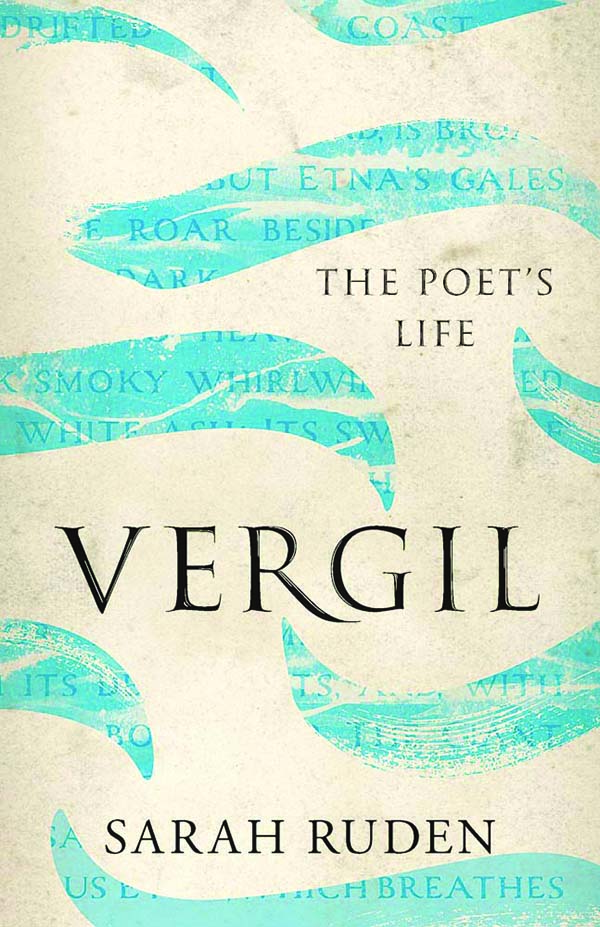
How to write a biography without biographical information
Micah Mattix
On the first page of Sarah Ruden’s biography of Vergil, she states the problem that any biographer of the ancient poet and author of the Aeneid faces: We know almost nothing about him. “The man is like Shakespeare,” she writes. “He disappeared into his writing.”

So, why write a biography of him, and how might one go about it if one did? The answer to the first question might be money. That was certainly Stephen Greenblatt’s motivation in writing a highly publicized biography of Shakespeare nearly 20 years ago. Greenblatt got a six-figure advance for Will in the World, which sold 150,000 copies on the first day of publication and was on the New York Times’s bestseller list for nine weeks. But only Shakespeare is Shakespeare, of course, and no other author, living or dead, comes close to generating the amount of interest he does.
KEEPING THE NOVEL ALIVE BY READING, AND ARGUING, WELL
Ruden in her preface stated that she decided to write a biography of Vergil largely out of curiosity. She is the author of an acclaimed translation of the Aeneid, and she became increasingly intrigued, she writes, as she worked on the translation by how a “mere life” could “produce such beauty”: “After much hesitation, I set off on a quest to know Vergil the man better through what probably follows from such things as his physical, social, and literary contexts and his own literary innovations.”
Thus, we have the answer to the second question. How to go about writing a biography of someone who left behind no memoir, no collection of letters, and whose entire biographical record consists of a few pages in Suetonius Tranquillus’s On Illustrious Men? Use historical contexts to speculate as to what he might have thought or could have done. Call it the Might-Have-Could-Have approach to biography.
The risk of such an approach is obvious. The subject of the biography becomes a mere object of our own projections. What we get is not Vergil himself, but the proto-fascist Vergil or the anti-imperialist Vergil, the proto-Christian Vergil or the gay Vergil. I am reminded of Daniel Mendelsohn’s article in the New Yorker a few years ago in which he presented Vergil as something of a tragic, bleeding-heart liberal, whose sympathies are on the side of the victims whom “‘empire’ leaves in its wake” but who was pressed into the service of empire nonetheless.
Ruden is aware of this risk. “We need to make our own peace with our own histories,” she writes, “and leave Vergil out of them.” She proposes to avoid it by sticking closely to what Vergil wrote and extrapolating only those biographical tidbits that seem plausible. H. L. Mencken may have been right when he wrote that criticism “is no more than prejudice made plausible.” But a biography that is no more than prejudice made plausible is no biography at all.
Problematically, Ruden proposes to compare Vergil to his modern “descendants” — that is, to modern writers — to gain insight into his life. She argues that because writers are categorically different from other people, it makes sense that Vergil might have more in common with other writers, even those who lived 2,000 years after he died, than he did with the people of his own time. After all, wasn’t Vergil, like so many modern writers, an eccentric who lived an unconventional life marked by an unwavering commitment to art? “Many things about Vergil’s life made more sense to me,” she writes, “once I dared to grasp that this shy young man from nowhere, who struggled from line to line as he composed and revised, sensed in some part of his mind that if he tried hard enough he could cause the world to welcome millions of copies of his work.” She goes on to compare him to Sylvia Plath and Virginia Woolf, among others.
Alas, rather than getting us closer to the “real Vergil,” Ruden’s biography simply gives another Vergil — Vergil the brooding, sensitive modern writer who sacrifices everything for his art. This leads to problems.
One thing we know about Vergil from Suetonius is that he was frequently ill and rarely “appeared in public in Rome.” We’re told this was because his fame made it difficult for him to move about freely in the capital. Ruden claims (and I think she is right) that he also avoided going to Rome because he was shy and committed to his work. But she suggests that he may have even faked illness to avoid social contact and was something of a misanthrope. “I am convinced,” she writes, “that his characters tend to fall short in differentiation and believable thoughts and feelings because he did not like other people much or find their minds reliably interesting compared with his own.” Her further evidence of this misanthropy is that he wrote a lot about nature.
She wants to see Vergil as a modern artist who eschews authority and “civic and professional duty,” but she is at pains to explain how he could be one while also writing an epic poem whose primary purpose was to celebrate the Roman empire. This leads her to make muddled statements like this:
The poet’s quasi-propagandistic work remains worth reading now that all its ideological and cultural assertions but the most universal have been discredited, at least in liberal democratic nations. Modern ethics reject unquestioning religious, filial, and patriotic ‘duty,’ and most especially the divinely decreed ‘fate’ of one race to conquer and rule others. But the Aeneid is still running on its literary steam.
This divorce of content and form forces Ruden to identify Vergil’s literary accomplishment with something like verbal decoration. Ruden means it as a compliment when she writes that “Vergil was the only poet” who could “relieve and decorate” the “necessary heavy-handedness” of a “full-length epic poem about the ruling dynasty’s purported ancient foundations.” But this diminishes, rather than heightens, Vergil’s accomplishment. Immediately after this, she admits that Vergil and Augustus likely did not disagree on the work’s “major themes.” So why divorce those themes from style and prosody in the first place?
Even more problematically, Ruden suggests that several of the poems of the Appendix Vergiliana, a supposed collection of Vergil’s juvenilia that many scholars dispute, were indeed written by Vergil because it is implausible that he would not leave a record of his development. Why? Because Vergil was more of a modern poet than an ancient one. “If Vergil was, as he appears to have been,” Ruden writes, “a modern type of conspicuously isolated author with an independent, obsessive drive to perfect certain literary forms, rather than the typical ancient author who wrote for public occasions and communal edification, then a large archive makes sense.” Talk about begging the question.
Ruden even wonders whether Vergil became so obsessed with perfecting the Aeneid that Augustus became paranoid and killed him. Vergil died of heatstroke in Athens, which doesn’t make much sense according to Ruden. “If the Romans knew anything, it was how to deal with hot climates,” she continues. “Did Augustus, alive to the difficulties of either controlling or sidelining the popular, well-liked author who had written the great national poem but then fled the nation, turn his mind to the advantages of Vergil’s bad health worsening to a lethal degree? … Was treatment of Vergil’s condition withheld? Or was sunstroke a cover story for something else? Was there something in Vergil’s refreshments?”
CLICK HERE TO READ MORE FROM THE WASHINGTON EXAMINER
She quickly adds that this is all “speculative reconstruction.” A better phrase for it is “pure speculation.” The only thing she insists on is that the ancient account of his death doesn’t make sense.
Fine. But why not leave it at that? Because word counts must be met, I suppose, for book contracts to be kept.
Micah Mattix is a professor of English at Regent University.
